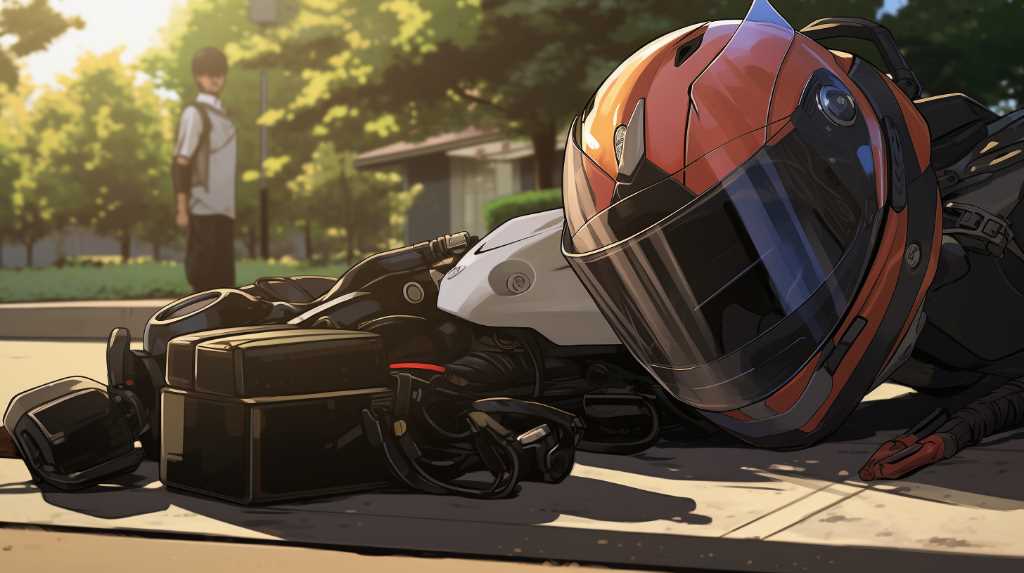
After a small motorcycle accident, make sure you’re safe first. If you’re hurt, get medical help right away. If you’re okay, move to a safe spot so you don’t block traffic and keep yourself safe from any more danger.
Then, swap important information with the other person, like phone numbers, insurance details, and vehicle registration numbers. It’s important to take pictures of the accident scene and write down anything that might help with insurance or legal issues.
Don’t forget to tell the police and your insurance company about the accident. This starts the claim process and makes sure there’s an official record of what happened.
Assess Personal Safety
After ensuring you are no longer in the path of danger, your first priority following a minor motorcycle accident should be to evaluate your own physical condition for any injuries. Check for any immediate pain and examine your body for cuts, bruises, or potential fractures. It’s crucial to recognize that even if you feel fine, adrenaline can mask pain signals, so proceed with caution.
If you are capable, move to a safe area to avoid any secondary incidents. Should you discover any injuries or feel disoriented, seek medical attention promptly, even if the injuries appear superficial.
Safety gear, such as helmets and protective clothing, should be inspected for damage as they may have absorbed impact and could be compromised.
Move to a Safe Area
After you’ve checked for injuries, find a safe spot away from traffic to avoid more danger. Make sure to move both yourself and your motorcycle out of the way to help stop any more crashes or harm. If your motorcycle is still working and it’s safe, ride it to the side of the road or onto a sidewalk. If you can’t move it, turn on your motorcycle’s blinking warning lights to let other drivers know you’re there. You can also use road flares or reflective triangles if you have them.
Keep watching the traffic closely and stay well away from cars that are still moving. It’s really important to keep yourself and everyone else on the road safe, and getting to a safe spot helps with this. It also gives you a good place to handle things after the accident.
Exchange Information
After a motorcycle accident, it’s important to gather everyone’s contact and insurance details because this info is needed for insurance claims and maybe legal issues. Make sure you get their full names, where they live, phone numbers, and insurance policy numbers. If you can, snap pictures of their insurance cards and driver’s licenses. Write down what kind of vehicles they have, including the model, make, and license plate numbers.
When you’re talking to the others involved, be polite, but don’t say it was your fault. Anything you say about the accident could be used in court later. You should also write down the names and badge numbers of any police officers who come to the scene; you might need their reports later.
Getting all this info right there and then makes things much easier later on.
Document the Scene
Make sure you’re safe first, then take photos or videos of the crash scene. You’ll need these to show where the cars ended up, any damage you can see, and what the road looked like. This helps with insurance, any legal stuff, and your own records.
Take big pictures to show the whole scene and close-ups for details like damage or things on the road that might have caused the crash. If people saw what happened, their words could help, so ask if you can film them talking about it. Just stick to the facts when you’re recording things.
Good pictures and videos can make dealing with the crash a lot easier later on.
Report the Accident
After making sure everyone is safe and you’ve recorded what happened, you need to call the police right away to let them know about the motorcycle crash. This is key because even a small crash needs an official report for your insurance and as a record of what went down. The police will come, check out the situation, and make a report that includes what people say happened and the officer’s take on the crash.
Stay where you are until the police get there, unless someone needs to go to the hospital immediately. When you talk to the police, be honest but don’t say it was your fault or guess about things. What you say can really matter if there’s a disagreement or insurance claim later on.
Conclusion
If you’re in a small motorcycle crash, make sure you’re safe first, then get to a safe spot.
Swap important info like insurance details with anyone else involved, and take photos or notes about what happened.
Tell the police about the crash to help with any legal or insurance stuff later.
Doing these things helps you handle the situation in an organized way, keeping you and everyone else safe and responsible.